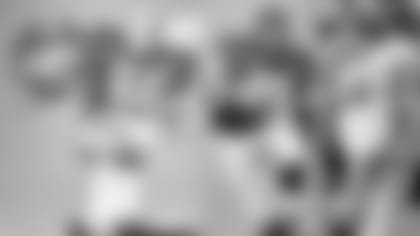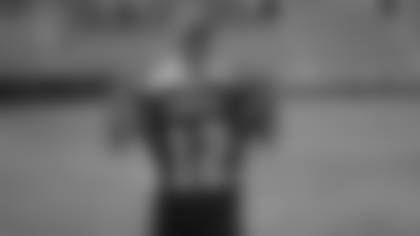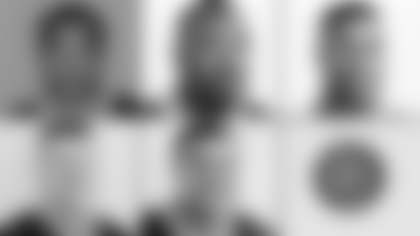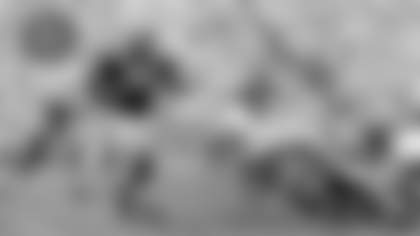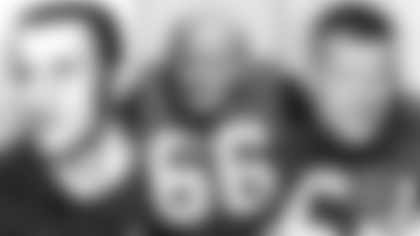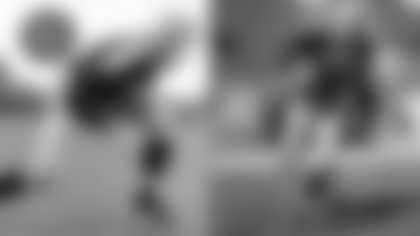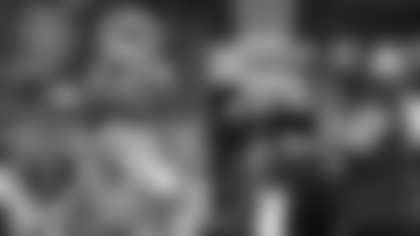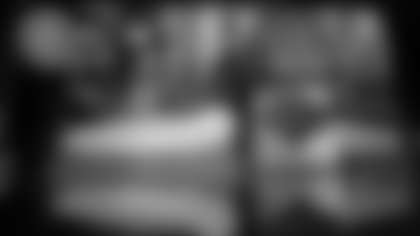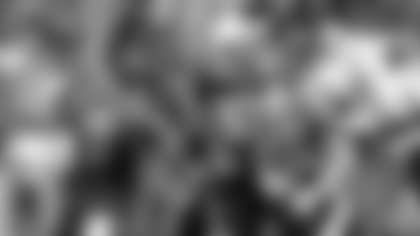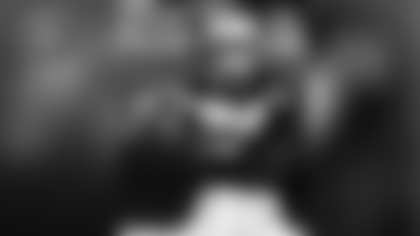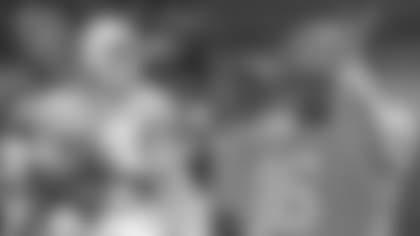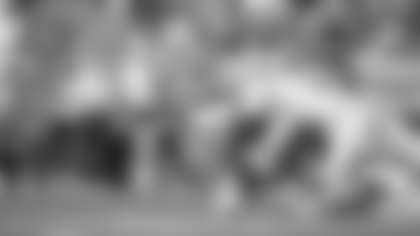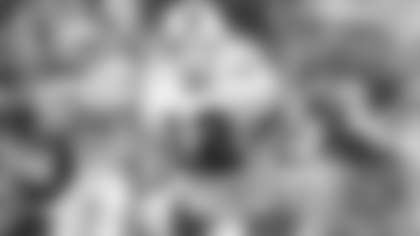Cliff Christl started gathering oral histories with former Packers and others associated with the team in 2000 and will continue to gather them as Packers historian. Excerpts from those interviews will be periodically posted atwww.packers.com
Burt Gustafson worked for the Green Bay Packers for 18½ years, serving four head coaches: Dan Devine, Bart Starr, Forrest Gregg and Lindy Infante. A native of Marquette, Mich., Gustafson was an assistant coach, and both a college and pro scout during his years with the team. Part I of Gustafson’s oral history covered the coaches he worked for and with. Part II looks at the personnel people he worked with and some of the players, including three Pro Football Hall of Fame linebackers – Ray Nitschke, Dave Robinson and Ted Hendricks – he tutored as linebackers coach from 1971-74.
On Lloyd Eaton, named director of player personnel by Devine in 1972 and reassigned to West Coast scout at his own request in 1976: "He knew a football player. He was a straight guy. It was always his way or no way. In all the years I worked with him, both at Northern Michigan for one year and Wyoming, it was his way or no way."
On why Eaton asked to be relieved of his personnel director duties not long after Starr became GM and coach: "He got into it with Bart. Lloyd never told me to his dying day. He passed away. Lloyd's wife didn't like Green Bay. That didn't help. She came to Green Bay and got a little house off Ninth Street. Then he got disgusted. You couldn't cross Lloyd. You couldn't have an argument with him because you weren't going to win in his mind."
On Bill Tobin, hired by Devine as a scout in 1971, elevated to the newly created position of director of pro scouting in 1972 and later director of player personnel for Chicago and GM for Indianapolis: "I liked Bill. He was a good man."
On Dick Corrick, a member of the Packers' personnel department for 17 years, including his time as director of player personnel from 1978 to 1986: "He was thorough about his personnel work, but I wasn't around him enough other than prior to the draft. I was on the road a lot (when I was scouting)."
On whether the perception that Starr ignored Corrick's advice to his detriment was true: "I would have to agree on that."
On whether the Rich Campbell pick when Corrick wanted to draft Ronnie Lott was an example: "That was Zeke's (Bratkowski) call."
On Doug Hafner, who was hired by Starr as director of player personnel in 1976 and fired late in the 1977 season after selecting four future starters – Mike Butler, Ezra Johnson, Greg Koch and Derrel Gofourth – in his only draft: "He and his assistant (Pete Marasco) did more watching of TV games than getting out in the field and doing a thorough job. They had an unusual method of getting information on players."
On Starr's explanation that Hafner was fired for communication problems with the office staff: "He was rather gruff."
On (Gustafson) being named director of pro scouting by Starr in 1979 after Starr had let the position sit vacant for two years: "Here's what happened: The college guy couldn't keep up with it all, scouting the active players and the colleges."
On Tom Braatz, Packers' vice president of football operations from 1987-91: "He didn't have any use for me. I'll tell you something about Tom Braatz: I never saw him look at one reel of film. Lindy (Infante) wanted me to look at the draft board one day and the rating of some players. I went in there and got the information for Lindy because I was working for Lindy. For two years I had a contract, administrative assistant to the head coach."
On being asked by Braatz to once again evaluate pro players: "When Tom Braatz came on board, he gave me 10 days to re-rate everybody in the league. I got up at 4 o'clock in the morning and worked at my dining room table until 6, then walked to the stadium and worked the rest of the day to get the job done in 10 days."
On whether it was possible to do a good job: "It was impossible. It takes at least the better part of a day to properly evaluate a player."
On what he knew about Devine's 1974 trade for quarterback John Hadl: "We picked up an offensive lineman from the LA Rams. It might have been a tryout. I can't remember the player, but he was going to make an impression on me by giving me an LA Ram playbook. What he didn't know was that the head coach at the time (Chuck Knox) was a good friend of mine, and the next day I mailed it back to him. But the player told me, 'You don't want to trade for (Hadl). He doesn't have an arm anymore. He's got a bad shoulder or whatever.' So I go and rap on Dan's door. Remember how he used to use the official's locker room for his own locker room during the week? He'd go in there and take a shower after he lifted a few weights or whatever. Well, I rap on the door to give him this information. He's on the phone and he covers up the receiver and says, 'Just wait.' Then he opened up the door again and said, 'What's your problem, Burt?' I told him, and he said, 'Well, I just made the trade. I was just talking to (Rams owner) Carroll Rosenbloom.'"
On the Packers drafting tackle Tony Mandarich No. 2 overall in 1989 ahead of Barry Sanders and Deion Sanders: "Mandarich was Tom Braatz's boy. Braatz didn't like me from the get-go, and I didn't like him. I went in and told him, 'Tom, I've looked at some film on Mandarich. I saw him in the Iowa game, and this guy can't play in the NFL.' 'Why? 'He couldn't block a 6-foot-3, (200-some-pound) kid playing defensive right end for Iowa. He couldn't pass block him. You're going to have to do a lot of coaching to get him to be a pro player.' Then I walked out of the room. (Mandarich) didn't have the feet. I think he wore a 10 or 11 shoe. Guys his size wore 13, 14s."
On running back Brent Fullwood, Braatz's first pick for the Packers and the fourth overall choice in 1987: "Did you know Brent Fullwood couldn't sign his own name? Check this out. Marianne (one of the personnel department secretaries) will tell you that he would go into her on Friday and have her help him make out a check so he could go across the street to the bank and get his weekend pocket money. He couldn't learn the system."
On whether Nitschke had anything left when he lost his starting job to Jim Carter in 1971: "I think he did. I won't name the assistant (Dave Hanner), but (Nitschke) didn't have any love for the assistant and the assistant didn't have any love for him. And they had been teammates."
On what (Gustafson) still liked about Nitschke: "Filling a hole. He was football smart. He played mean. He played mad."
On his relationship with Nitschke: "Good. He knew I didn't make the decision to replace him."
On Robinson, who also played for him in 1971 and '72: "I never coached two players as smart as Robinson and (Ted) Hendricks."
On Fred Carr, a Packers Hall of Fame linebacker: "He had some difficulty learning the system. Athletic-wise, he was a talent."
On any favorite Carr stories: "One time I was coming back from a run, training for a marathon. Here comes Freddie walking up through the quadrangle at St. Norbert. It was 6 o'clock in the morning, and we didn't wake the players up until 7. I said, 'Freddie. where the hell you been?' 'Oh coach, I was fishing.' 'Where were you fishin'?' "Down on the river.' 'Where's your pole?' 'Oh, I leave it down there in a tree.' I said, 'Freddie, there are no trees on the shoreline of the Fox River on the St. Norbert property.' He finally owned up that he was up all night."
On any other Carr stories: "We had a rule that they were not to order a pizza at night, after 10, 10:15, from the pizza parlors in De Pere. Hawgie (Hanner) and I shared a room in the dormitory across from Freddie and Robinson. They ordered a pizza, and the guy delivered it to the window of their room. Hawgie had bed check that night and walked in the room. I'm listening to the conversation because both doors are open, and we had no air conditioning back in the '70s in Sensenbrenner (Hall). Hawgie walks in and the conversation goes something like this: 'Hey, you guys got a pizza in here?' Robinson giggles. Freddie says, 'No coach, we don't have a pizza in here.' 'Freddie, are you sure?' Hawgie looks around the room and goes to the wastebasket and there it is, all folded up and stuck in the wastebasket. Hawgie chewed the cud like 24 hours a day and he spits in the wastebasket. Freddie says, 'Oh coach, that's a $12 pizza.'"
On linebacker Tom MacLeod, selected as the Packers' defensive rookie of the year in 1973 and then traded a year later for Hendricks: "He got in the doghouse with Devine over the strike. Dan got mad at him, and we traded him. I don't know what took place between he and Dan."
On MacLeod's potential: "I liked him. Reading the play. He played it all well. He was a good football player. Not great speed, but his ability to diagnose a play was outstanding. He didn't make many mistakes and get out of position."
On Hendricks, who was acquired by Devine in 1974 and traded by Starr a year later over contract issues: "Nobody made more big plays. He played one year. We didn't keep him and I think it was over something like $12,000, $14,000, $16,000, a ridiculous amount compared to today."
On the special relationship between Hendricks and Carr: "That year, late in the season, Freddie got the flu and was sent home by the trainers. Freddie didn't come to the meeting, so I took the projector and the game film over to his apartment. I'm sitting there breaking the game down and critiquing Freddie's game. The doorbell rings. I say, 'Freddie don't worry, I'll get it.' I open the door and there stands Ted Hendricks. He has a case of Budweiser under each arm. I said, 'What are you doing here Ted?' He says, 'Freddie is sick. I'm here to watch the game with him.'"
On what the Packers lost when Hendricks signed with Oakland: "With his height and arm reach, nobody could get to him to block him. If you looked at film when he went to Oakland, on third down, he was freelance. In fact, Al (Davis) himself told me this. When I was pro personnel director, I saw Al a lot. He told me, (Hendricks) could go line up in any gap he wanted."
On Scott Hunter, quarterback from 1971-73: "He was a good person, good in the locker room. Lacked arm strength."
On quarterback Jerry Tagge, who played from 1972-74 after being a No. 1 draft pick: "He had movement issues. He had trouble getting away from the rush."
On Jack Concannon, a veteran quarterback acquired in a trade in 1974: "I think he was tough. That's about the end of it."
On whether he thought the Packers had enough talent to win during his 18 mostly losing seasons in Green Bay: "Other than the quarterback position, I think we had sufficient talent to win playoff games. We had some talent."
Gustafson, 92, lives outside Crystal Falls, Mich. The excerpts above were taken from interviews conducted in 2014 and last month.



